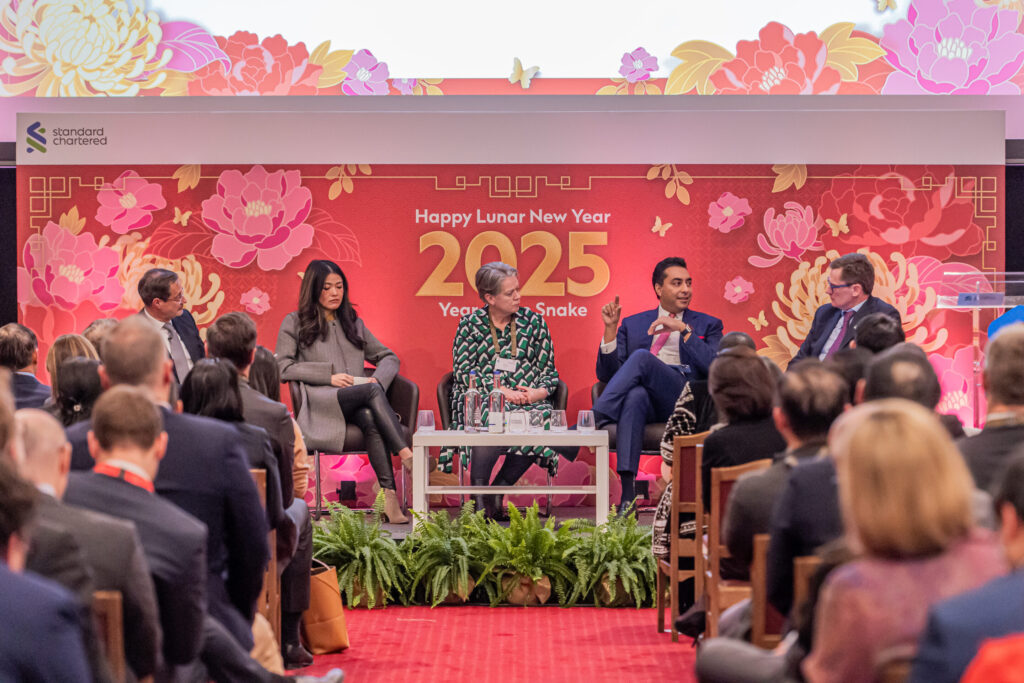Navigating Asia’s evolving landscape: Insights from the Lunar New Year Forum hosted by Standard Chartered
on February 14, 2025Standard Chartered UK hosted its flagship Lunar New Year Forum and Celebration this February at the historic Guildhall in London. We were pleased to welcome industry leaders, clients, and employees to celebrate the Year of the Snake.

Symbolising new hopes for the future and prosperity, Lunar New Year holds great significance for billions worldwide, no less so than at Standard Chartered. We remain passionate about supporting clients, businesses and individuals across the world, with their long-term growth plans and fostering meaningful relationships.
This year’s event was more than just a celebration —it included an insightful forum that delved into the shifting dynamics of the global economy, trade, and geopolitics.
Informative and engaging keynotes from Eric Robertsen, Global Head of Research at Standard Chartered, and Sir Robin Niblett, former director of Chatham House, were followed by a lively panel discussion in which speakers were joined by Wei Li, BlackRock’s Global Chief Investment Strategist, Isabelle Jenkins, Head of Financial Services at PWC UK, and Saif Malik, Standard Chartered’s UK CEO and Head of Client Coverage.
Together, they explored some of the most pressing issues businesses will face in the coming years, with insights that set the stage for a new year of strategic opportunities.
Here, we have summarised their six key takeaways from the event that will shape the year ahead:
1. A shift to “reglobalisation”
The evening’s discussions painted a picture of a world in transition. The days of a predictable, cyclical global economy are behind us. Instead, we are entering an era of fragmentation, characterised by new trade corridors. Asia, the Middle East, and Africa are becoming increasingly important hubs, with non-oil trade between the GCC and Asia growing particularly strongly. The world is not witnessing deglobalisation; rather we are seeing a form of reglobalisation, driven by emerging markets. Investors must adapt and expand their focus to emerging regions if they want to stay ahead in a more complex global marketplace.
2. A new chapter in the geopolitical power struggle
A “new Cold War” between the U.S. and China took centre stage during the event, particularly in Sir Robin Niblett’s keynote address. He explored how the relationship between these nations has evolved into a multi-domain contest involving military power, technological advancements, and global governance. With both countries championing very different models of leadership, the impact on global business and trade could be profound. Investors will need to understand these dynamics and navigate the evolving geopolitical landscape carefully, as decisions made by both powers could influence international trade, security policies, and business alliances for years to come.
3. Could the rise of de-dollarisation be exaggerated?
While central and global banks have been slowly reducing their dollar holding, the concept of de-dollarisation is overstated. Central bank dollar diversification is not undermining the value of the dollar and within the global payments system, the dollar dominates. Indeed, the dollar accounts for almost half of payments made on SWIFT and remains the primary currency for global trade. Instead, we are seeing the creation of parallel networks, such as China’s Cross-Border Interbank Payment System (CIPS). Interconnecting institutions which can navigate and utilise different payment networks will be crucial in enabling corporates and investors to maximise global opportunities.
4. AI and the green transition present long-term opportunities
As investors and businesses seek to navigate increased levels of global uncertainty, there is a focus on “mega forces” that will shape future economies. Generative AI and the low-carbon transition have the potential to help drive future growth, increasing productivity and opening up opportunities for increased investment in infrastructure. However, governments around the world will have to find ways to manage the increasing risks presented by an ageing population that puts stress on healthcare systems and shifts the dynamics of workforces across developed nations.
5. Capital is shifting: resource nationalisation on the rise
The role of capital in global markets is also undergoing a shift. Governments are looking to protect their strategic assets – becoming more selective about who they trade with. This is particularly evident in sectors like mining and energy, where ownership of valuable resources is becoming increasingly politically charged. Alongside this, sovereign wealth funds such as Saudi Arabia’s Public Investment Fund are playing a growing role in financing domestic projects, rather than looking beyond borders. As businesses look to deploy capital, they must consider these new trends in resource control and the evolving role of private capital in emerging regions.
6. Trump as the global wildcard
Trump’s unpredictable policies are shaking up the rules-based system that has defined the global economy for decades. Tariffs and trade wars could disrupt global supply chains and unsettle financial markets, while a more protectionist stance from the U.S. could accelerate economic fragmentation, prompting other governments to follow suit or attempt to fill the gap in foreign aid left by USAID. His interventions in conflicts like Ukraine have the potential to cause a ripple effect that could see Europe’s relationship with China improving. The question isn’t just whether Trump wins for America —but how the world prepares for the unpredictability his leadership could bring.
From new trade corridors to technological innovation, investors who are prepared to adapt to these changes will be the ones leading the way into the future. As we embrace the Year of the Snake, Standard Chartered’s Lunar New Year Forum set the tone for a year of resilience, growth, and strategic thinking.
